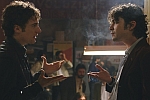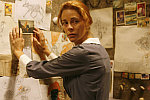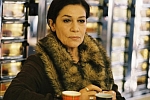 Shadows off the beaten path
Shadows off the beaten pathUNDER THE BOMBS | VIVERE
< < F O R E I G N > >
last update 23.Mar.08
See also: SHADOWS FILM FESTIVAL
 R E V I E W B Y R I C H C L I N E
R E V I E W B Y R I C H C L I N E Mio Fratello E Figlio Unico
Mio Fratello E Figlio Unico
 A sharp sting of real-life interaction makes this offbeat Italian drama gripping even for those of us who never quite connect with the setting or situations.
A sharp sting of real-life interaction makes this offbeat Italian drama gripping even for those of us who never quite connect with the setting or situations.
Accio (Germano) is the rebellious Benassi son, letting his hot temper get the best of him in most situations (the nickname Accio means bully). His older brother Manrico (Scamarcio) is happy with a simpler life, so is the apple of their parents' (Finocchiaro and Popolizio) eye, while their sister Violetta (Rohrwacher) focuses on her music. But it's the 1960s, and Italy is in the grip of an ideological war between the communists and fascists. And when the brothers take opposite sides, their camaraderie is put to the test.
The lively mayhem in this working class family is hilarious as they communicate more through shouting, arguing and smacking than through actual words. Yet even when things get serious, they maintain good humour and mutual affection. Although this gets increasingly difficult as the left and right jostle for control of post-war Italy, and the family is divided along political lines. And it certainly doesn't help that Accio is smitten with Manrico's girlfriend Francesca (Fleri).
In other words, the film is bursting with life. Luchetti and the cast keep the energy level high; the political clashes have the passion of youth, and we can feel the whole community's yearning for freedom from corruption (the Benassi family lives in a falling-down house; they've waited years for the local council to let them into their promised new home). Meanwhile, the plot is a rollercoaster of real-life situations brought on by personal decisions, outside forces and both good and bad luck.
The film's complex and fairly messy approach to characters and situations keeps us thoroughly engaged, even if we never quite understand why people swap allegiances so easily. There are moments that are drop-dead beautiful, with powerful emotions and clever resolutions, followed by scenes of wrenching tragedy. In the end, the film works best for audiences who can place this within the Italian political context. For the rest of us, it's more of an intriguing romp.
scr Daniele Luchetti, Sandro Petraglia, Stefano Rulli
with Elio Germano, Riccardo Scamarcio, Diane Fleri, Angela Finocchiaro, Massimo Popolizio, Alba Rohrwacher, Luca Zingaretti, Anna Bonaiuto, Ascanio Celestini, Vittorio Emanuele Propizio, Claudio Botosso, Antonino Bruschetta
 release It 20.Apr.07,
release It 20.Apr.07, US 28.Mar.08,
UK 4.Apr.08
07/Italy 1h48
CANNES FILM FEST
TORONTO FILM FEST
6.Mar.08
 R E V I E W B Y R I C H C L I N E
R E V I E W B Y R I C H C L I N E El Orfanato
El Orfanato
 With heavy echoes of new Mexican cinema (the film was produced by Guillermo Del Toro), this skillfully made ghost thriller has the ability to thoroughly freak us out as it twists and turns through its intensely personal story.
With heavy echoes of new Mexican cinema (the film was produced by Guillermo Del Toro), this skillfully made ghost thriller has the ability to thoroughly freak us out as it twists and turns through its intensely personal story.
Laura (Rueda) was raised in a coastal orphanage, and when she grows up she moves back with her husband Carlos (Cayo) and their 7-year-old son Simon (Princep), who they've never told is adopted. Soon, Simon has made several new imaginary friends who strangely seem to know rather a lot about him. And about his mother. When he vanishes one day, Laura becomes obsessed with finding him, even though it will mean taking a trip back into her past with the help of a medium (Chaplin) and a paranormal expert (Vivar).
There are all kinds of wrinkles from the very outset that keep us on our toes. In a prologue, we see Laura as a young girl who doesn't actually want to be adopted. And we learn that as a mother, she's not only kept her son's origins from him, but she's never told him he's HIV-positive. These kinds of details give the film an undercurrent of mystery and intrigue that brilliantly set us up for the creep-out that follows.
Bayona directs the film using all of the tricks of the genre, from things going bump in the night to eerie side characters (like Carulla's nosey social worker) who pop up at all the wrong times. There are also echoes of various childhood stories, such as the Peter Pan way that Simon's new "friends" can't grow up. And Bayona also stirs in some solid Hitchcock-style camerawork as he traps us inside the house with Laura and all manner of supernatural scariness.
This is gripping and profoundly unsettling filmmaking that draws us into its web of mystery. We are desperate to know more about what's going on here, and yet we're afraid to discover the truth. It's a darkly beautiful film that has a lingering emotional punch. And as it gets increasingly dark and even sad, the constant surprises keep us right on the edge of our seats.
scr Sergio G Sánchez
with Belén Rueda, Fernando Cayo, Roger Príncep, Geraldine Chaplin, Edgar Vivar, Mabel Rivera, Montserrat Carulla, Andrés Gertrúdix, Mireia Renau, Oscar Casas, Georgina Avellaneda, Carla Gordillo Alicia
 release Sp 11.Oct.07,
release Sp 11.Oct.07, US 28.Dec.07,
UK 21.Mar.08
07/Spain Warner 1h40
CANNES FILM FEST
TORONTO FILM FEST
11.Feb.08
 R E V I E W B Y R I C H C L I N E
R E V I E W B Y R I C H C L I N E Sous les Bombes
Sous les Bombes
 With a doc-style approach and an intimate storyline, this involving film quietly provides some meaningful, hopeful insight into a very messy situation.
With a doc-style approach and an intimate storyline, this involving film quietly provides some meaningful, hopeful insight into a very messy situation.
While going through a divorce in Dubai, Zeina (Farhat) sends her son to live with her sister in southern Lebanon. After another round of tit-for-tat bombings from Israel, she makes it to Beirut and finds just one driver, Tony (Khabbaz), who will take her south. Their journey is full of obstacles, including the gulf between them: Zeina is a Shiite Muslim, Tony is a Christian. As they search for Zeina's son amid the overwhelming devastation, they're forced to understand each other.
The film opens with terrifying footage of bombs dropping on Lebanon in July 2006, leaving 1,200 people dead and 1 million homeless (there were reportedly no casualties in Israel from the Hezbollah attacks). In these bombed-out places, the drama unfolds with a bracing realism, even with rather disparate acting styles. Farhat's Zeina is arrogant and pushy, while Khabbaz plays Tony in a more relaxed, sometimes comical style. But both are engaging, especially as they struggle to connect with each other despite personal and cultural barriers.
We're pulled into their stories as they travel through the rubble of their country, meeting people who have seen children and family members killed around them as they ran for their lives. "We can rebuild the houses," one observes, "but the lost people don't come back." As Tony and Zeina navigate their way through various impasses and adventures, they begin to break through each others' surface. The film's anecdotal structure continually reveals details about them, made all the more gripping by the fact that it appears to have been shot during the war with a largely improvised script.
The filmmakers assemble this seamlessly, filming on location with scenes of outrageous destruction that require no special effects at all. Sequences in which refugees search for lost relatives or bury the dead in mass graves couldn't have been staged. Along the way both Tony and Zeina realise that they have more in common than they think: they're just two divorcees longing for their homes in the South. And in its quiet way, the film cuts through the politics and religion to find the human centre.
scr Michel Léviant, Philippe Aractingi
with Nada Abou Farhat, Georges Khabbaz, Rawya El Chab, Bshara Atallah
 release US 18.Jan.08,
release US 18.Jan.08, UK 21.Mar.08
07/Lebanon 1h38
VENICE FILM FEST
SUNDANCE FILM FEST
31.Jan.08
 R E V I E W B Y R I C H C L I N E
R E V I E W B Y R I C H C L I N E
 This three-strand drama is like a German cross between Crash and Babel, looking at a fateful night from the distinct perspectives of its three central characters. It's involving and intriguing, but perhaps a bit too tidy.
This three-strand drama is like a German cross between Crash and Babel, looking at a fateful night from the distinct perspectives of its three central characters. It's involving and intriguing, but perhaps a bit too tidy.
Francesca (Zimmering) is a frazzled workhorse, driving a cab in Cologne day and night while caring for her helpless dad (Kayacik) and wild teen sister Antoinetta (Schnitzer). On Christmas Eve she's finally had enough and heads off into the night, encountering a crashed car in which the older woman Gerlinde (Elsner) is unconscious. The two women connect in an unusual way and drive together to Rotterdam in search of Antoinetta, who has run off with her rocker boyfriend (Weeber). But things get even stranger as the night progresses.
We see these events first from Francesca's point of view, then from Gerlinde's and finally through Antoinetta's eyes. And of course, the three perceptions are vastly different, with varying levels of understanding and continual revelations that change everything completely. Relationships are continually shifting both as events unfurl and as we learn more about each character. Even the circumstances surrounding Gerlinde's accident take on new meaning with each perspective.
Writer-director Maccarone creates a terrific atmosphere--dark and intriguing from the start, with seductive cinematography and an elusive sense of mystery. We always know there's more going on than meets the eye, and the information is revealed in tantalising morsels. It's also rather engaging to see three women of different generations deal with personal issues that are so big that they're essentially oblivious to what the others are facing.
The cast is edgy and natural, including the side performers, bringing insight and emotional resonance to each encounter, even when the script starts laying on far too many contrived coincidences. But it's the marvelous Elsner who makes the film worth seeing, as she delivers another understated yet grippingly powerful turn, saying far more with a glance than the sometimes simplistic dialog can express.
Actually, there's rather a lot of corny plotting that leads to the strangely heartwarming finale, in which all of the sharp edges are softened by a bit too much mutual affection. Even Maccarone's efforts to manipulate the storyline are useless in the hands of such a fine actor.
with Hannelore Elsner, Esther Zimmering, Kim Schnitzer, Egbert-Jan Weeber, Tygo Gernandt, Aykut Kayacik, Nina Vorbrodt, Indre Bogdan, Inger Hansen, Evert Aalten, Maarten Hemmen, Krischan Frehse
 release US 29.Feb.08,
release US 29.Feb.08, UK Mar.08 llgff
07/Germany 1h37
Closing Night Film:

13.Mar.08 llgff


See also: SHADOWS FILM FESTIVAL | SHORT FILMS
© 2008 by Rich Cline, Shadows
on the Wall